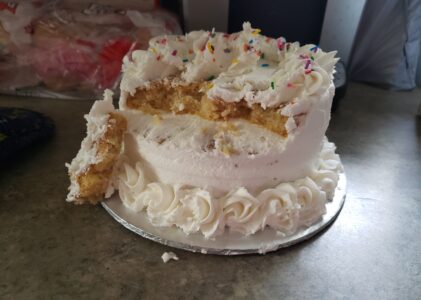I did something the other day I don’t usually do. I found myself scrolling through social media. One reel hooked me into another, and then another and another and on and on it went.
I know the concept of reels is to hook the viewer into more and more. I got hooked. Then next thing I knew an hour and half went by at the speed of my finger. Can you relate? Has this EVER happened to you?
After I had finished chastising myself on the waste of time, I realized something significant.
I realized a lot of the reels I watched were about transformation. I have to admit I have been doing research on the concept of transformation and engaging in some transformative practices.
Algorithms caught on and filled my feed with reels about transformation. Now, not all reels were about transformation. Some were just plain funny and I laughed ‘til I cried. I love a sense of humour. I can still see the outrageous stuff people do and I chuckle to myself. Hmmmm.
Right. Let’s get back to what I was talking about.
So, was scrolling a waste of time? I’m going out on a limb and saying “NO”.
The fact that I realized what I had been watching was of some value made me a bit giddy. I had held the belief that all social media scrolling was to fill in time waiting for appointments or an avenue to killing off brain cells. I was wrong.
Choke! Choke! Gag!
Yes, I was wrong and I am not afraid to admit it. It isn’t easy but I do admit it.
In that hour and a half, I learned some new things and I cemented in the things I already knew and discovered. And now I get to share what I learned with you.
If you aren’t interested in transforming any area of your life, duck out now. I suspect you’ll be bored.
If you are interested in transforming an area of your life read on. My prayer is that you will be blessed and get excited to begin the process of transforming your life to what YOU want it to be.
To start I think we need to ask the question, “Is transformation really possible?”. I give the answer to this question two thumbs up. YES! It is possible to transform your life.
Think about it. Most movies we watch are about transformations. Dr. Jekyll and Mr. Hyde. The Hulk. Kevin Spacey’s character in The Usual Suspects. Eddie Murphy in The Nutty Professor. The Gremlins. Star Wars and don’t forget about every Marvel movie. I believe I made my point.
So yes, transformation is possible. Transformation is not an easy road. Transformation is definitely worth the time, effort and money you invest in the process. So, where do you begin?
Transformation usually starts with a crisis. You hit rock bottom and find yourself in despair and or depression. You can’t do this anymore. How did you get here? How did you get into this? What just happened? How could he?
I am sure you can relate to at least one of these questions during a crisis in your life. I’m also sure you can add a thousand questions to this list.
I remember thinking during one of my many crises that maybe it was me. “If I could just find a way to change me everything would be okay.” So, I tried to change me, a transformation. I tried to become what I thought he wanted. That didn’t work! It actually made matters worse. I was miserable because I was living against my values, what I believed and who I was. My misery made the whole situation worse. Yes, transformation is not always positive.
I also remember a time when my second marriage was in dire trouble. I tried everything I knew at the time to “fix it”. This went on for a few years. Then one morning I woke up and decided it was not about him anymore. It was not about us anymore. It was about me.
I started my journey to wholeness, strength, confidence, and self-worth.
I engaged in psychotherapy to find my way out of the internal chatter that threatened to bury me. I read books. I found online groups for support. I went to retreats, seminars and workshops. I took part in online challenges. I sought out the thoughts and ideas of leaders in the field of transformation. I studied biographies of people who believed in themselves, went against “the norm” and found themselves, their strengths, and their passions.
Ladies, it has been quite the journey. It has cost me a lot of time, money, tears, anger and joy, mostly joy. This journey continues and I do not want to stop. I have found beauty among the ashes. I have found inner joy. I am happy – most of the time. I am an overcomer. I have even had do-overs!
So, where do you start on your journey of transformation – if you decide to start the challenge?
You have heard the quote by Lao Tzu, “The journey of a thousand miles begins with one step.” This is exactly where to start. You start with the first step.
The first step is your decision to invest in yourself. If there is to be a change in your life, that change starts with you.
I believe you made that decision when you started reading this article or looking online for topics on personal change and transformation. We all long to be like the butterfly who emerges from the cocoon as a beautiful creature.
What do you do when you’ve made that decision? Good question! And bravo for asking it. When you ask a good question, you get a good answer. Your next step is acceptance.
Acceptance begins with acknowledging and confirming your emotions, even the painful ones.
When a woman experiences trauma she can allow herself to feel the depth of her sadness, anger, or fear without judgment. Instead of pushing these emotions away or denying their existence, she can acknowledge them as valid responses to her experiences.
Allow me to tell you a story.
Maya was no stranger to life’s challenges; she has weathered her fair share of storms and emerged stronger each time. Despite her resilience, there was still a heaviness in her heart—a lingering ache from wounds that ran deep.
One day Maya found herself sitting by the riverbank, lost in thought. Memories of past sufferings flooded her mind, threatening to consume her in a sea of sorrow. Tears welled up in her eyes as she struggled to make sense of it all.
In that moment of vulnerability, Maya realized that she had been fighting against herself, resisting the pain that clamored for acknowledgment. With an audible moan, she let go of her defenses and allowed herself to feel—to truly feel—the weight of her emotions. She embraced her sadness, her anger, her fear, like old friends returning home after a long journey.
Maya felt a gentle stirring within her—a flicker of self-compassion igniting in the depths of her soul. She spoke softly to herself, offering words of kindness and understanding, like soothing balm to a wounded heart.
“I forgive you,” she whispered, her voice trembling with emotion. “I forgive you for carrying this burden for so long. You deserve peace, and I will walk beside you every step of the way.”
With each passing day, Maya practiced self-compassion in small but profound ways. She learned to let go of the heavy cloak of self-blame that had weighed her down for years. Instead, she embraced the lightness of forgiveness and grace. She set boundaries to protect her tender heart. She surrounded herself with love and support.
As the seasons turned and the world bloomed around her, Maya found herself transformed. She was not transformed by the absence of pain, but by the acceptance of it. She had become a beacon of hope for others, living proof to the power of acceptance and self-compassion on the journey of healing.
And so, dear reader, remember Maya’s story as you navigate your own path of transformation. Embrace your pain, your imperfections, with open arms, for it is in acceptance that true healing begins.
This is the beginning of your journey in transformation. Acceptance takes time. Take this opportunity to accept. Give yourself the gift of time to accept yourself as you are, scars and all. Allow yourself to feel your emotions. Don’t run from them. Your emotions are part of you, a beautiful part of you.
Show yourself compassion. This means treating yourself with the same kindness and understanding that you would offer to a friend. Present yourself with words of comfort and reassurance during difficult moments. It’s okay to feel overwhelmed. Remind yourself that you are doing the best you can given your circumstances.
Acceptance also means letting go of self-blame and recognizing that traumatic events are not your fault. A woman who has experienced abuse can release feelings of guilt or shame and understand that she did not deserve what happened to her. Instead of blaming herself for past actions or decisions, she can focus on nurturing herself and begin moving forward.
Self-compassion and acceptance involve embracing your imperfections and recognizing that nobody is perfect. A woman can forgive herself for past mistakes or perceived shortcomings, understanding that they do not define her worth. Instead of striving for unattainable standards of perfection, celebrate your uniqueness and inherent value.
Acceptance includes setting boundaries to protect your emotional well-being and honor your needs. You can assertively communicate your boundaries with others, expressing what is and isn’t acceptable behavior. Prioritize self-care and respect your limits. In this way you show self-compassion and cultivate a sense of empowerment.
When you practice acceptance and self-compassion you develop a deeper sense of self-awareness, resilience, and inner peace. These habits serve as the foundation for healing and growth, allowing you to embrace your true self with love and compassion.
There is more to discover on this journey of transformation. Next week we will uncover mindset shifts that can change your perspective and significantly affect your personal healing journey.
May you always be guided by the gentle whispers of self-compassion, leading you home to the depths of your own beautiful soul.



